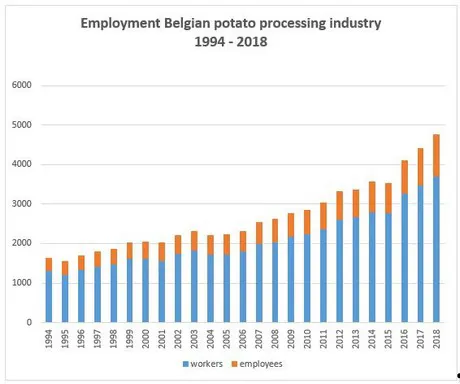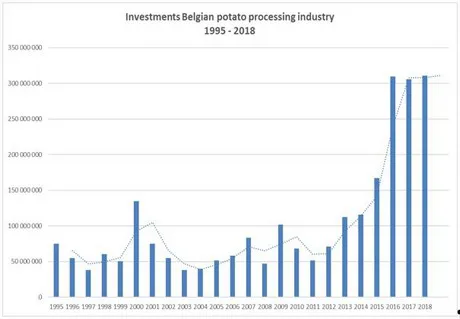Belgapom, the association for the Belgian potato trade and processing industry, announced that in 2018 the 5 million tonne mark was passed with regard to processed potatoes. This is absolutely a new record and what makes it even more remarkable, is that it is the sharpest annual increase since the nineteen-nineties. As a reminder: in 1990 around 500,000 tonnes of potatoes were processed into fries, mashed potato products, crisps or flakes and granules. 28 years later, the sector can report an increase of 1000 %.
The use of potatoes as a raw material rose by 11.6% in 2018. This is by far the sharpest increase in the history of this still relatively new sector of the Belgian food industry.
Increase in employment and investments form the basis for further sustainable growth
The sector continues to invest in the future, both with regard to quality and quantity. Sustainability is the leitmotiv through it all. Efforts are being made in the area of the sustainable cultivation of potatoes, environmentally friendly production and logistics.
Employment has also seen remarkable growth with an increase of 8 % compared to 2017. At present, 4762 blue and white-collar workers are employed in this strongly automated sector.

The Belgian potato-processing industry is located in the heart of the European production area and it can make use of an ever more number of potato professionals and a unique logistical network with international ports nearby.
On the other hand, the Belgian potato sector has made use of the large supply of potatoes in the second half of the 2017-2018 season following a record potato harvest. Despite the setback of the 2018-2019 growing season with the exceptional drought and repeated heatwaves, there was a large supply of potatoes in the second half of 2018. Quite a number of batches could not be kept and – in consultation with the growers – it was decided to process them in the autumn of 2018.

Not all good news
However, the prolonged drought and high temperatures during the 2018 -2019 growing season caused extensive damage.
Not only will the low yield of the 2018 harvest probably have a major impact on the business results of all the operators of the Belgian potato chain, the confidence in this strong, largely family-run sector of SMEs developed over many years also threatened to be shaken up.
Belgapom has as much as possible stimulated dialogue between the companies executing the contracts. They are also continuing to focus on achieving a trade organisation for the potato sector that should provide a fixed base to this dialogue.
The high potato prices on the free market helped lead to a rising price for the finished products, which did not have a favourable impact on the Belgian competitive position vis-à-vis other production countries.
For the full report, click here.
Romain Cools
Belgapom
Tel: +32 475328757
Email: romain@fvphouse.be
